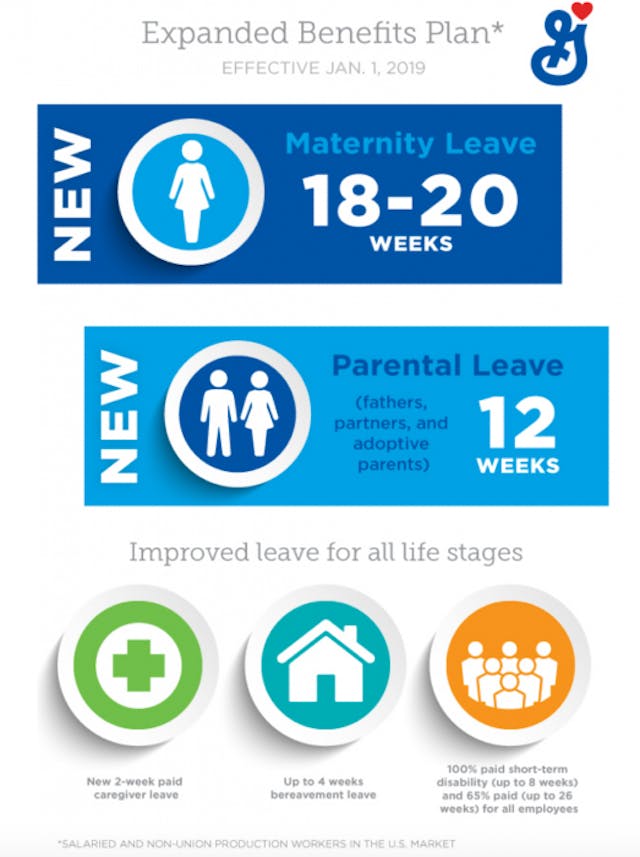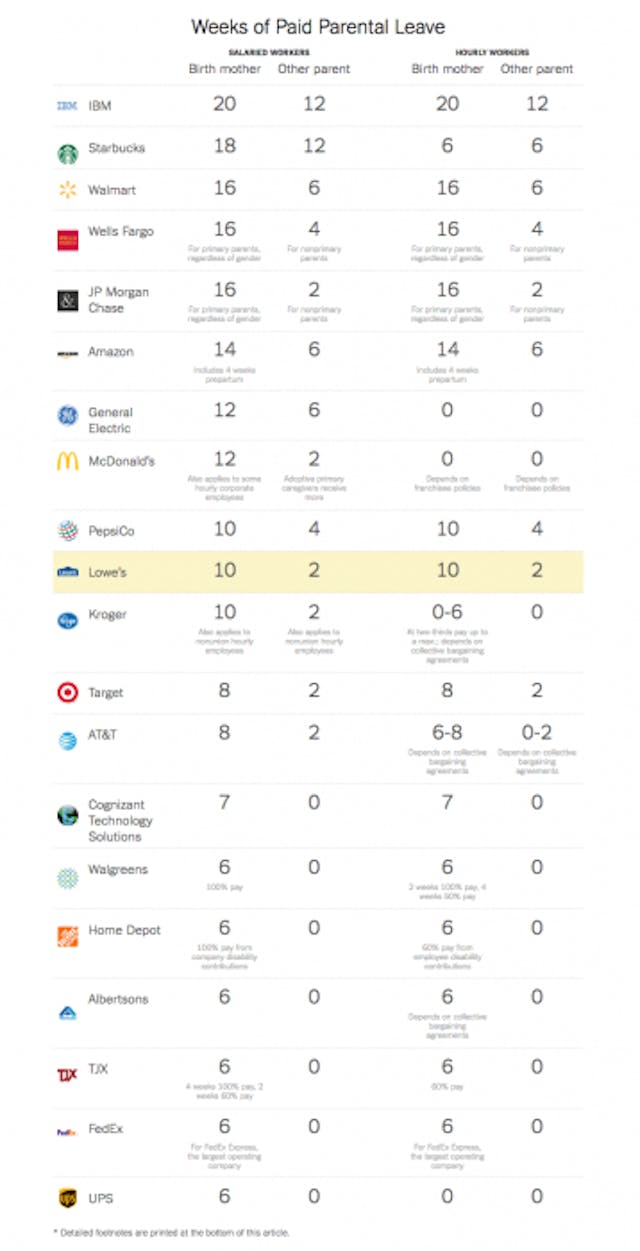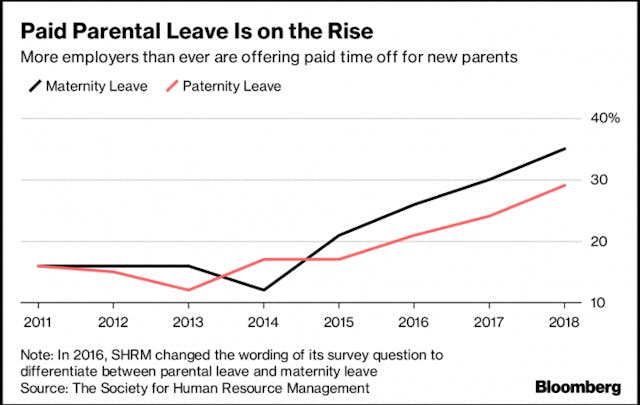
Baby booms celebrated at California fire department and Chicago medical network
Nancy Flanders
·
Analysis·By Catherine Livingston, PhD
Parental leave on the rise as companies expand paid time off for new families
Parental leave can be a huge factor in the decision to choose life… or death. Among commonly occurring reasons women cite for abortion are concerns their careers would be in jeopardy, or that they would not be able to pay their bills because they don’t have paid leave, despite federal laws that require companies offer parents leave for the birth or adoption of their children. But there are signs that women are finally getting the support they need and deserve.
General Mills recently garnered headlines for their expansion of paid leave for new parents when it announced:
One of those major life moments is having or adopting a little one. General Mills is increasing fully paid time off for new birth mothers to 18 to 20 weeks, and parental leave (for fathers, partners and adoptive parents) to 12 weeks, effective Jan. 1, 2019.

READ: They prove women can be leaders and moms… yet they still push abortion
But General Mills is not alone. The New York Times reported this year that when Lowe’s announced its paid leave program, the result rounded out the leave policies of all the largest U.S. employers:
The 20 largest employers in the United States now offer paid parental leave to at least some of their workers. Lowe’s, which had been the only one that gave no employees paid time off after they had a baby, announced a new leave policy for all new parents on Thursday.

Source: New York Times
Bloomberg reports that companies may be trying to give employees desirable perks, even when they don’t raise salaries:
More than 700 of the 1,012 organizations surveyed by SHRM said that increased benefit offerings in the last year were meant specifically to retain talent.
“Money is not the way to motivate people,” contends Liz Supinski, director of data science at SHRM [Society for Human Resource Management]. Benefits such as paid parental leave “may be more psychologically appealing” than a raise, she said.
It’s also a sign of progression internationally, as the Times notes:
In most American families, both parents work, and many are struggling to combine work and parenthood. Companies have been trying to adjust to that fact. In the absence of a federal paid leave policy — the United States is the only industrialized country not to have one — companies and some states and cities have been starting their own.
These changes in the workplace, while only a beginning, are an encouraging sign. As Live Action News reported recently, pregnancy discrimination has come to the forefront for American women. From being told to lift heavy materials, to being relegated to pump breast milk in a supply closet — or to being fired outright — pregnancy discrimination encourages abortion. While it is illegal to discriminate against a woman because of her pregnancy, many office cultures have made it clear that the job comes first. But thankfully, as Bloomberg shows in this graph, paid parental leave is on the rise across the nation:

READ: When pregnant women in leadership support abortion, they fail women
When companies increase their leave policies and pay their valuable employees so they can birth, adopt, or foster a child, the companies send a strong message to employees that they are valuable to the company — and so are their children. There is dignity in policies such as these, and an employee treated with respect and dignity who is also given the means to support him or herself in their brief time off, in turn is more likely to be more loyal and productive in the company. It’s a win-win for every stakeholder. And the nation’s top 20 companies have figured this out.
Scientific American reports that paid leave actually has a cost-saving benefit to companies, based on research from the Center for Economic and Policy Research in Washington, D.C., which surveyed a successful California paid leave program. It concluded:
These results suggest that paid parental leave provides an economic boon to businesses. California’s experiment showed that paid family leave generated cost savings for businesses, either due to reduced turnover or because they coordinated their own wage replacement benefits (such as paid sick days or vacation) with the program. Other states have since adopted similar policies including New York, New Jersey, Rhode Island and Washington.
Among their findings:
Employers reported that PFL had either a “positive effect” or “no noticeable effect” on productivity (89 percent), profitability/performance (91 percent), turnover (96 percent) and employee morale (99 percent). (See table below)
91 percent of employers stated that they were unaware of any instances of abuse of the program.
Small businesses were less likely than larger establishments (those with more than 100 employees) to report any negative effects.
At face value, it might seem expensive to offer paid leave to employees, but in the end, it can actually reduce turnover, increase loyalty, and result in higher productivity. No one should have to throw a job out, or go hungry, for having a child. By expanding paid paternal leave options, companies are both valuing life and providing yet another reason for women to not consider abortion.
Live Action News is pro-life news and commentary from a pro-life perspective.
Contact editor@liveaction.org for questions, corrections, or if you are seeking permission to reprint any Live Action News content.
Guest Articles: To submit a guest article to Live Action News, email editor@liveaction.org with an attached Word document of 800-1000 words. Please also attach any photos relevant to your submission if applicable. If your submission is accepted for publication, you will be notified within three weeks. Guest articles are not compensated (see our Open License Agreement). Thank you for your interest in Live Action News!

Nancy Flanders
·
Analysis
Nancy Flanders
·
Newsbreak
Angeline Tan
·
Human Interest
Nancy Flanders
·
Issues
Nancy Flanders
·
Pop Culture
Cassy Cooke
·
Human Interest
Catherine Livingston, PhD
·
International
Catherine Livingston, PhD
·
Newsbreak
Catherine Livingston, PhD
·
Human Interest
Catherine Livingston, PhD
·
Human Interest
Catherine Livingston, PhD
·